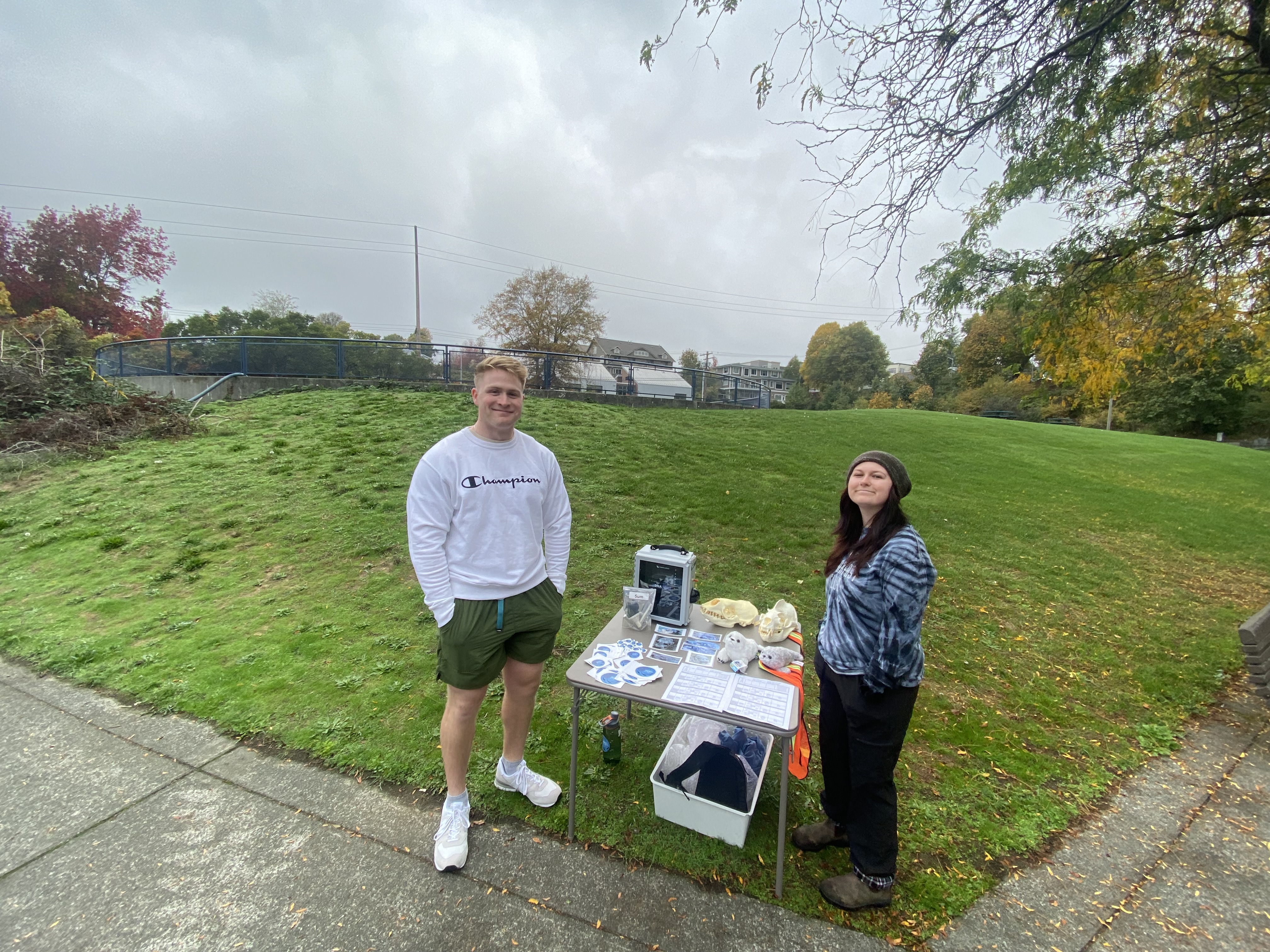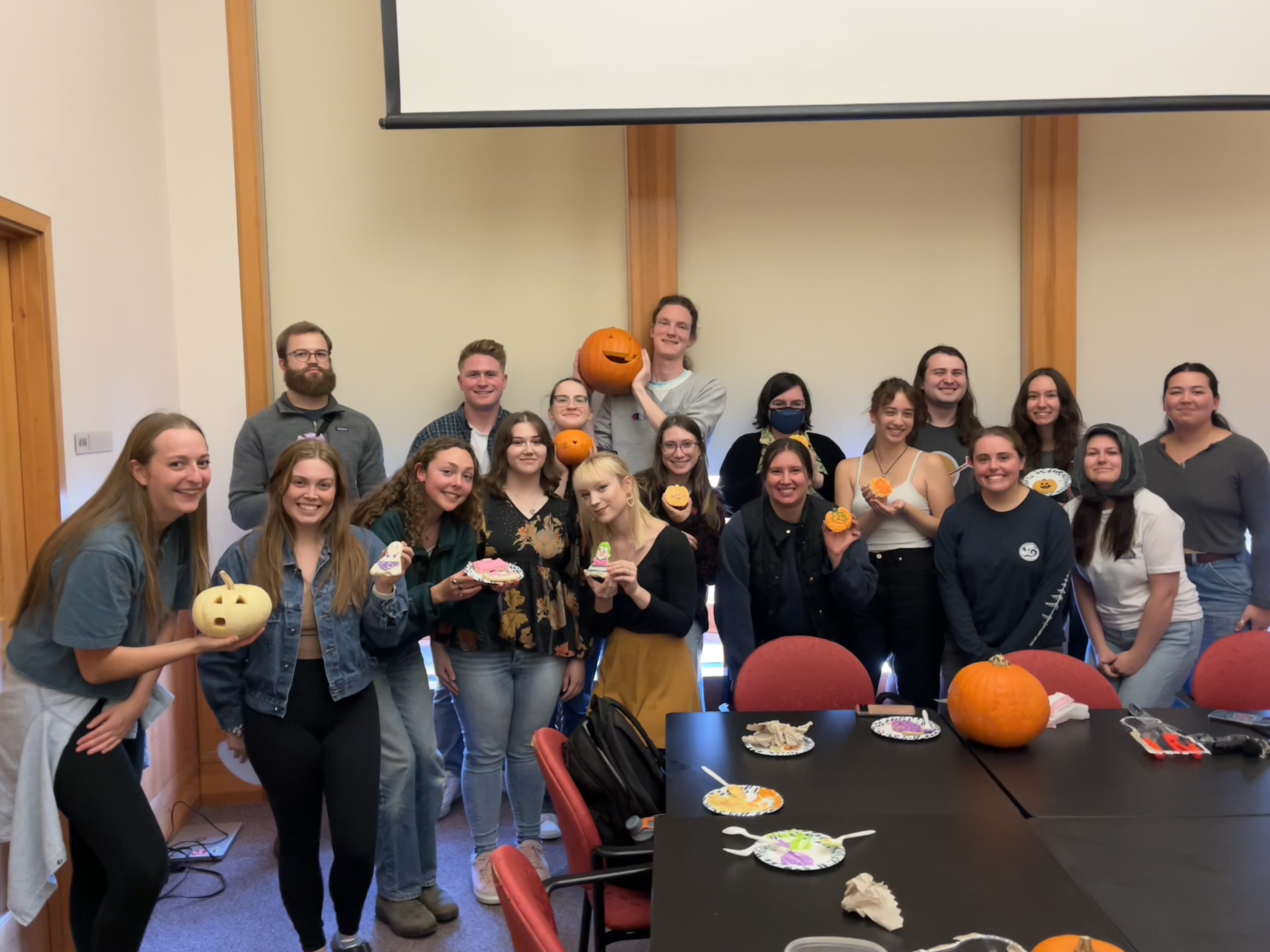Student Spotlight: A Look Into MMEL
February 2, 2024
Western students have many opportunities to join research labs in the Biology department. Today’s student spotlight looks at some of the student roles and research happening in the Marine Mammal Ecology Lab (MMEL). MMEL, led by Professor Alejandro Acevedo-Gutierrez, PhD, works toward the goal of gaining greater understanding of the role of marine mammals in their environment and their interactions with humans. Research in the lab is conducted by both graduate and undergraduate students. Graduate students in the lab are the field leaders who collect most of the data for the lab and conduct independent research to publish. Undergraduate students can join as research assistants and mentored students. Mentored undergraduates are given opportunities to conduct independent research in the lab. MMEL currently has over 20 participating undergraduate research students. Research opportunities are a great way to apply knowledge learned in biology classes and gain experience working in a lab. Professor Acevedo-Gutierrez stated, “One aspect that I love about the setup of MMEL is that it gives many students the opportunity to get started in helping in research and then move on to other labs with more responsibilities, it gives some students the opportunity to continue in the lab managing the long-term project but also conduct their own research, and empowers those students with a sense of ownership, leadership and responsibility.”
If you are interested in learning more about the MMEL head over to the Laboratory Webpage or read the Student Blogs, which are updated monthly!
Alex Otto subsampling a harbor seal tissue sample from the West Coast Marine Mammal Stranding Network archive.
Photo by Victoria Vinecke
On a boat searching for marine mammals. Pictured from left: Kameran Rodriguez, Victoria Vinecke, Alex Otto, Jasper McCutcheon.
Photo by MMEL Member

Victoria Vinecke holding eDNA filter during DNA extraction.
Photo by Alex Otto
Alexandrea (Alex) Otto is a second-year Biology grad student in the Marine and Estuarine Science Program. Alex’s research is in collaboration with the Washington Department of Fish and Wildlife and the West Coast Marine Mammal Stranding Network. In her research, Alex is using minimally invasive samples and newer, cost-effective molecular techniques to update information on the genetics of harbor seals, (Phoca vitulina), in Washington State. Alex explains, “The primary goal of my research is to update the genetic population structure of harbor seals for the local urgency in management of harbor seals that are part of a bigger ecosystem home to many other species. To do so, we are using SNPs (single nucleotide polymorphisms) and a GT-Seq (Genotyping-in-the-Thousands by sequencing) panel to accomplish this goal.”
Victoria Vinecke, another second-year Biology grad student in the Marine and Estuarine Science Program who works in MMEL, states, “My current research consists of collecting environmental DNA (eDNA) of individual harbor seals from water-filtered samples taken at Whatcom Creek located in downtown Bellingham, WA. Within these samples, I hope to collect individualized genetic footprints that can be used to demonstrate obtaining individualized DNA. I will also be evaluating the feasibility of collecting sex markers to assign sex to individual harbor seals that visit the creek through the same sampling method. Lastly, I will use the samples taken to investigate if harbor seal nuclear DNA was obtained during the sampling process. If nuclear DNA is obtained, I can potentially link individuals to known population substructures to identify if different subpopulations visit the creek using DNA sequencing.”

Jasper McCutcheon and Victoria Vinecke next to the educational outreach table set-up. They are patiently waiting in excitement for the bikers to come through!
Photo by Alex Otto

The MMEL carving pumpkins and decorating cookies as a bonding activity in Fall quarter 2022.
Photo by MMEL member
Jasper McCutcheon is an undergraduate Biology major in the Ecology, Evolution, and Organismal (EEO) emphasis and currently a lab co-manager in MMEL. Jasper says, “My research focuses on harbor seal behavior while their head is above the water (what I call surface events). We are trying to determine the relationship between how loud it is in the air (anthropogenic noise levels) during observations and how many seals we see, how long the surface events are, and the frequency of their different behaviors.”
Haley Recob, a Biology major and Environmental Science minor who is passionate about habitat restoration and conservation sciences, is about to embark on a new research project this quarter with co-lab member, Maren Duffy. Haley explains, “We will examine the potential factors that may explain the different sex ratios across harbor seal haul-out sites in the Salish Sea... I am super excited to get started!” Haley hopes their research findings will lead to presentation at conferences and eventually publication.
MMEL is a space of teamwork and collaboration. With so many projects happening simultaneously, there are many ways to assist with research. Grad students Victoria and Alex enjoy being given the chance to mentor undergraduate researchers with new lab and field techniques, in addition to growing their own skillsets by assisting with others’ projects. Bonding events like picnics and documentary showings help build a sense of community amongst MMEL members. They often share outside talents with one another, from creating art designs and a lab logo to giving an ArcGIS crash course.
Though the lab works well as a cohesive team, research never comes without some roadblocks. Victoria’s eDNA research must be conducted in an alternative lab due to issues with possible prior seal eDNA contamination. However, she has found a place to do her research thanks to Dr. Matt Zinkgraf who has donated some “seal DNA free” space in his lab. Alex has also utilized multiple labs for her research. She states “Dr. Dietmar Schwarz’s co-advisement and connecting molecular lab has been instrumental in my research!” A barrier that Jasper McCutcheon is currently facing is not yet fully understanding the techniques to analyze his data. He says that to get past this he will need to put in the time to read scientific papers on how to apply and use the models and analysis techniques. Jasper says he is a bit daunted by all the reading but is excited to learn this new skill!
Want more info on how to become involved in a research lab within the Biology department? Head over to the Research Participation webpage to find out how!